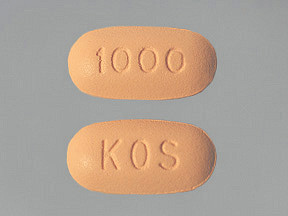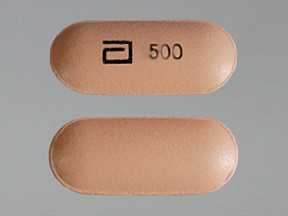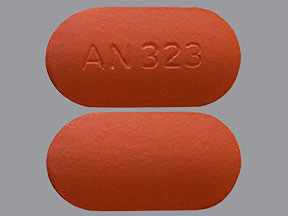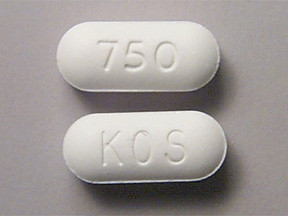NIACIN EXTENDED-RELEASE - ORAL
PHONETIC PRONUNCIATION: (NYE-a-sin)
COMMON BRAND NAME(S): Niaspan
GENERIC NAME(S): niacin
Uses
USES: Niacin is used with a proper diet and exercise program to help lower "bad" cholesterol and fats (LDL, triglycerides) and raise "good" cholesterol (HDL) in the blood. It is generally used after non-drug treatments have not been fully successful at lowering cholesterol. Niacin is also known as vitamin B-3 (nicotinic acid), one of the B-complex vitamins. It may be used with or without other medications. Lowering "bad" cholesterol/triglycerides and raising "good" cholesterol helps prevent strokes and heart attacks. Lowering fats may also help reduce the risk of pancreas problems (pancreatitis) in people at risk. In addition to eating a proper diet (such as a low-cholesterol/low-fat diet), other lifestyle changes that may help this medication work better include exercising, losing weight if overweight, and stopping smoking. Consult your doctor for more details.
How to use NIACIN EXTENDED-RELEASE - ORAL
HOW TO USE: Read the Patient Information Leaflet if available from your pharmacist before you start taking niacin and each time you get a refill. If you have any questions, ask your doctor or pharmacist. Take this medication by mouth with a low-fat meal or snack as directed by your doctor, usually at bedtime. Taking niacin on an empty stomach increases side effects (such as flushing, upset stomach). Do not crush or chew extended-release tablets. Doing so can release all of the drug at once, increasing the risk of side effects. Also, do not split the tablets unless they have a score line and your doctor or pharmacist tells you to do so. Swallow the whole or split tablet without crushing or chewing. Niacin is available in different formulations (such as immediate and sustained release). Do not switch between strengths, brands, or forms of niacin. Severe liver problems may occur. The dosage is based on your medical condition and response to treatment. To reduce your risk of side effects, your doctor may direct you to start this medication at a low dose and gradually increase your dose. Your dose will need to be increased slowly, even if you are already taking niacin and are being switched from another niacin product (such as immediate-release tablets) to this product. Follow your doctor's instructions carefully. If you also take certain other drugs to lower your cholesterol (bile acid-binding resins such as cholestyramine or colestipol), take niacin at least 4-6 hours before or after taking these medications. These products can react with niacin, preventing its full absorption. Continue to take other medications to lower your cholesterol as directed by your doctor. To lessen the chance of side effects such as flushing, avoid alcohol, hot beverages, and eating spicy foods near the time you take niacin. Taking a plain (non-enteric coated, 325 milligram) aspirin or a nonsteroidal anti-inflammatory drug (such as ibuprofen, 200 milligrams) 30 minutes before taking niacin may help prevent flushing. Ask your doctor if this treatment is right for you. Use this medication regularly to get the most benefit from it. To help you remember, take it at the same time each day. It is important to continue taking this medication even if you feel well. Most people with high cholesterol do not feel sick. Do not stop taking this medication without consulting your doctor. If you stop taking niacin, you may need to return to your original dose and gradually increase it again. Ask your doctor or pharmacist for instructions on restarting your dose if you have not taken your medication for an extended period (more than 7 days). It is very important to continue to follow your doctor's advice about diet and exercise.
Side Effects
Precautions
Interactions
Overdose
Images

- color
- medium orange
- shape
- oblong
- imprint
- KOS, 1000

- color
- medium orange
- shape
- oblong
- imprint
- KOS, 1000

- color
- medium orange
- shape
- oblong
- imprint
- logo and 500

- color
- medium orange
- shape
- oblong
- imprint
- logo and 500

- color
- medium orange
- shape
- oblong
- imprint
- logo and 500
Reviews
Faq for NIACIN EXTENDED-RELEASE - ORAL
Niacin extended-release oral medication is primarily used to treat high cholesterol levels and lower the risk of heart disease.
It works by reducing the production of "bad" cholesterol (LDL) and triglycerides while increasing the levels of "good" cholesterol (HDL) in the body.
Common side effects may include flushing, itching, headache, dizziness, an upset stomach, and diarrhea. These side effects usually improve over time.
Yes, it can. It may interact with medications like blood thinners, diabetes medications, and statins. It's important to inform your doctor about all the medications you are taking before starting niacin therapy.
It is usually taken once daily with a full glass of water, preferably at bedtime. It's important to follow the dosage instructions provided by your doctor or the medication label.
It may take several weeks for the full benefits of niacin therapy to be seen. Regular blood tests may be done to monitor cholesterol levels and adjust the dosage if needed.
Niacin should be used during pregnancy or breastfeeding only if clearly needed and under the supervision of a healthcare professional.
No, niacin extended-release oral medication is a prescription medication and is not available over-the-counter.
No, it is important to consult your doctor before stopping niacin therapy. Abruptly stopping the medication can lead to a rebound effect and increase your risk of certain conditions.
Disclaimer
IMPORTANT: HOW TO USE THIS INFORMATION: This is a summary and does NOT have all possible information about this product. This information does not assure that this product is safe, effective, or appropriate for you. This information is not individual medical advice and does not substitute for the advice of your health care professional. Always ask your health care professional for complete information about this product and your specific health needs.


No Reviews Yet